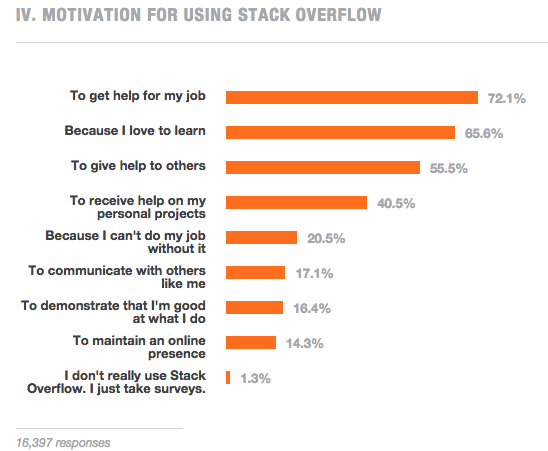One of the best visionary articles of all time, "Why Software Is Eating The World," by Marc Andreessen, deftly illustrates what is currently happening to companies worldwide. Today, this trend has become a reality in virtually every major industry across the globe.
According to Glassdoor’s 25 Highest Paying Jobs in Demand list, 14 of the top 25 U.S. jobs are tech-related. That’s over 50%—more than any other industry. Of those 14, nine are software-related and include engineers, architects, team leaders, QA, and data analysts. The Glassdoor report, issued last May, shows that software engineering jobs have the most openings, with a staggering 99,000 listings on the job posting site.
Today, companies are challenged with the continuous need to build talented R&D teams. In the search for talent, however, it's not just software engineers, but the social, community-engaged developers who are eating the world. I'll explain why social developers are often better developers, and I'll give you some advice for how you can retain social developers with community perks.
The competitive talent advantage
No matter what service an industry provides, mobile apps and online services are now an integral part of the realm. Banks, for example, are competing in mobile services with apps that let you scan checks, make deposits and withdrawals, transfer funds, and perform countless other actions. But banks are not alone. Another example are car manufacturers, who no longer see fast hardware production as a competitive threat. Rather, they readily acknowledge that they need to be aware of built-in software production (e.g., roadside assistance, sensors, GPS, etc.) in today's competitive market landscape. Additionally, airports are handling more online reservation check-ins, slowly rendering travel agencies and face-to-face interaction obsolete.
Emerging companies such as Airbnb and Uber are capitalizing on this swift-moving technology revolution. And in the traditional retail market, Amazon, a software company, is now the largest retailer in the world, leaving brick-and-mortar Walmart with a decline in sales for 2015.
With companies becoming more software-oriented, the need to develop additional skills and hire software development talent is increasing. And with the global competitive landscape now revolving around software and the value of software engineers skyrocketing, competition is centered on an organization’s core R&D talent. The startup "acqui-hiring" phenomenon is not new, and it is not rare for acquirers to show a lack of interest in their acquired startup’s technologies and services, and even terminate its operations. Software has become a competitive edge for every organization in every industry, and with reports such as Glassdoor’s, it possible that this is the highest demand we've ever had in the industry for software engineers.
Flying solo in the cloud
For years, companies have based their R&D strategies on the definition of their organizational aspirations. They focus on the five core benchmarks for determining just what those aspirations are: overall goals, how they will play out, how they can win, what capabilities they might have, and what management systems they may need.
Today, companies are pursuing a new style of R&D. Aspirations are broadcast up front, along with mission statements and development trajectories. Software engineers have been propelled to the top of the food chain, and software reigns as one of the primary assets of any successful organization.
R&D organizations look for developers who are team players but also able to fly solo on a project, understand user requirements, and develop and take ownership of delivery. In addition, they are not expected to code everything from scratch. Open source technologies support rapid and efficient innovation, and the cloud allows engineers to build vast portfolios of tools and software products immediately, without the need for hardware. What's more, today’s smart devices, with their great processing power, can be given intelligence, accessed worldwide through the cloud, and easily programmed.
In the hands of talented individuals, these capabilities can be used to not only facilitate traditional delivery methods, but also construct new businesses and business models.
The social developer
According to the Stack Overflow 2015 survey, the average, fully employed developer spends more than six hours a week working on open source side or hobby projects. Today, software development careers are made up of two roles. First, there's the traditional role within the organization. As in the past, engineers are still constantly trying to earn promotions and have their technical skills recognized within their companies.
Then there's an “outside” role in which the developer establishes an individual, professional brand across local or worldwide developer communities. As autodidacts, they leverage their knowledge and skills to pave their way within the community, be it through their contributions to open source via GitHub, answering Stack Overflow questions to get votes, or running their own technical blog. New emerging social software developers also recognize the benefits of online influencers. You can find them organizing and lecturing at webinars and meetups while leaving behind their personal marks.
This “social developer” path is proving to be even more important to the future of emerging developers than their status within their organizations. Enterprise HR and R&D managers who are looking to recruit software talent should examine the LinkedIn profiles and GitHub contributions of potential candidates at the same priority level as their professional resumes.
Developer community perks
Other than providing a safe path for developers who seek to further their careers, communities offer engineers four key perks that motivate them to stay. Communities help them:
- Contribute to the tech world
- Feel a sense of belonging
- Foster their own personal brand of development
- Gain professional growth.
The online community is a huge contributor in the world of software and IT, and these benefits drive developers and lead to social interactions and collaborative projects across the globe.
From the Stack Overflow 2015 Survey:

Staying power
Today, developers have more staying power than any other profession, thanks to peer collaboration and feedback from their communities. Community members now represent a key part of the engineering environment. Modern organizations already recognize and understand that developers need to spend a few hours per workday in their communities, and some encourage developers to contribute to the company blog or social media platforms to support recruitment efforts.
As Andreessen’s article “Why Software Is Eating The World” highlights, talented developers are the key. Ultimately, traditional R&D organizations that do not change their culture and fail to nurture participation in social and professional communities will lose talent and put their business at risk.
Image credit: Flick
Keep learning
Take a deep dive into the state of quality with TechBeacon's Guide. Plus: Download the free World Quality Report 2022-23.
Put performance engineering into practice with these top 10 performance engineering techniques that work.
Find to tools you need with TechBeacon's Buyer's Guide for Selecting Software Test Automation Tools.
Discover best practices for reducing software defects with TechBeacon's Guide.
- Take your testing career to the next level. TechBeacon's Careers Topic Center provides expert advice to prepare you for your next move.


